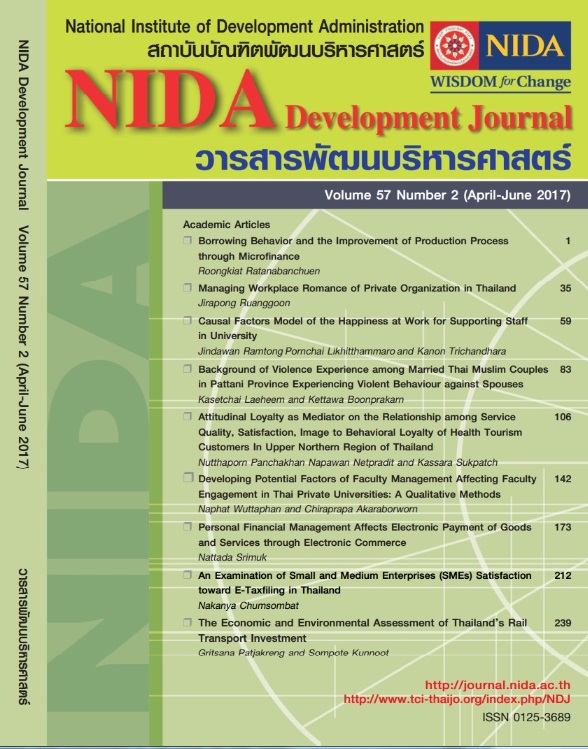พฤติกรรมการขอสินเชื่อ และศักยภาพของกระบวนการผลิต ผ่านระบบองค์กรการเงินฐานราก (Borrowing behavior and the improvement of production process through Microfinance)
Keywords:
องค์กรการเงินระดับฐานราก, สวัสดิการชุมชน, กองทุนหมู่บ้าน, การเข้าถึงแหล่งเงินทุน, ประสิทธิภาพของกระบวนการผลิต, ความเหลื่อมล้ำด้านรายได้, สินเชื่อ, Microfinance, Micro-insurance, Village funds, Ability to access capitalAbstract
องค์กรการเงินฐานรากเป็นสถาบันการเงินหลักของครัวเรือนในชุมชนทั้งการให้บริการเงินกู้ และสวัสดิการ ด้วยความสำคัญขององค์กรการเงินฐานรากที่มีขนาดใหญ่ขึ้นมาก งานวิจัยนี้จึงศึกษาความทั่วถึงและความเป็นธรรมในการให้บริการสินเชื่อแก่สมาชิกกองทุน รวมถึงวิเคราะห์ว่าการเข้าถึงแหล่งเงินทุนในองค์กรการเหล่านี้มีส่วนในการเพิ่มศักยภาพของกระบวนการผลิตได้มากน้อยเพียงใด จากกลุ่มตัวอย่างในจังหวัดตราด ที่กองทุนชุมชนหลักประกอบด้วยเครือข่ายสัจจะสะสมทรัพย์ และกองทุนหมู่บ้าน พบว่าครัวเรือนส่วนใหญ่จะกู้เงินเพื่อให้ได้ตามสิทธิ์ที่ได้รับจากกองทุนหมู่บ้านเท่านั้น เพราะมีต้นทุนกู้เงินที่ต่ำไม่สะท้อนต่อความเสี่ยงของผู้กู้ที่แท้จริง ซึ่งแตกต่างจากเครือข่ายสัจจะสะสมทรัพย์ที่สมาชิกมีความเป็นเจ้าของจึงมีการกำหนดอัตราดอกเบี้ย และเงื่อนไขการกู้เงินที่เหมาะสมกับความเสี่ยงมากกว่า โดยสมาชิกที่มีฐานะยากจนกับสมาชิกที่มีฐานะร่ำรวยต่างมีความเห็นที่สอดคล้องกันว่าการมีตำแหน่งทางสังคมไม่ได้ทำให้สามารถเข้าถึงเงินกู้ก่อนครัวเรือนอื่นและผู้ที่มีฐานะยากจนสามารถได้รับเงินกู้เพียงพอต่อความต้องการ เมื่อศึกษาพฤติกรรมการกู้เงินพบว่าครัวเรือนที่มีส่วนร่วมกับองค์กรการเงินฐานรากและครัวเรือนที่มีขนาดใหญ่จะมีแนวโน้มกู้เงินจากองค์กรการเงินฐานรากในสัดส่วนที่มากกว่าครัวเรือนอื่นอย่างมีนัยสำคัญ และครัวเรือนที่ถึงแม้สามารถเข้าถึงเงินกู้จากสถาบันการเงินทั่วไปได้ก็มีสัดส่วนกู้เงินจากองค์กรการเงินฐานรากมากกว่าครัวเรือนอื่นอย่างมีนัยสำคัญ แต่เมื่อพิจารณาสาเหตุของการกู้เงินและผลกระทบต่อศักยภาพของกระบวนการผลิต พบว่าการกู้เงินที่มีวัตถุประสงค์เพื่อการประกอบอาชีพมีส่วนช่วยในการเพิ่มขึ้นของศักยภาพของกระบวนการผลิตอย่างมีนัยสำคัญ การกู้เงินเพื่อเหตุผลอื่นไม่ได้ประกันว่าจะทำให้ศักยภาพของกระบวนการผลิตสูงขึ้นแต่จะเป็นเพียงการเพิ่มสภาพคล่องในการดำรงชีวิตเท่านั้น ดังนั้นนโยบายที่มุ่งหวังให้ครัวเรือนมีสภาพคล่องด้านการเงินที่ดีขึ้นจะต้องดำเนินการด้วยความระมัดระวัง เพราะไม่ได้ทำให้เกิดผลกระทบเชิงบวกต่อการเพิ่มรายได้ และศักยภาพของกระบวนการผลิต จนอาจส่งผลให้เกิดความเหลื่อมล้ำด้านรายได้มากยิ่งขึ้นแม้กระทั่งภายในชุมชนด้วยกันเองที่ครัวเรือนที่มีฐานะจะสามารถใช้ประโยชน์จากการเข้าถึงแหล่งเงินกู้จากกองทุนชุมชนได้มีประสิทธิภาพมากกว่าครัวเรือนที่มีฐานะยากจน
Abstract
Microfinance is considered as the main financial institution providing loans and social security to Thai rural households. This research paper aims to study the fairness in receiving loans from this institution and how the access to those loans can have an impact on the improvement of production process. Based on the sample in Trad province, the main microfinance institutions are the village fund set up by the government in 2001 and the network of Sajja Saving fund set up by a buddish monk named “Subin Paneeto” in 1990. This papers finds that households borrow from the village fund merely because of the right to borrow at a certain amount in each year. In constrast, households tend to borrow from Sajja Saving fund only in the case that they need extra capital. Although the loans from Sajja Saving fund is more expensive, the borrowing terms are more flexible and include features of risk controls. It is found that households at varying wealth levels have an equal right in accessing the fund and the loan amount is fairly adequate to cover their needs. The paper also shows that the proportion of households that have more participation in the activities of the funds significantly borrow more and households that can borrow from other formal financial institutions also significantly borrow more. However, only the households that have the real intention to borrow for work-related reasons can significantly improve the production process. Other households that borrow to support their day-to-day living expenses do not significantly show an improvement in the production process. Therefore, the liquidity enhancement from accessing the loans through microfinance does not guarantee a long-term benefit to increase household income. Policies whose aim is to tackle liquidity issues of rural households need to be implemented with caution otherwise income gap may be increased even within the same village as wealthy households can use the capital from microfinance more effectively.





